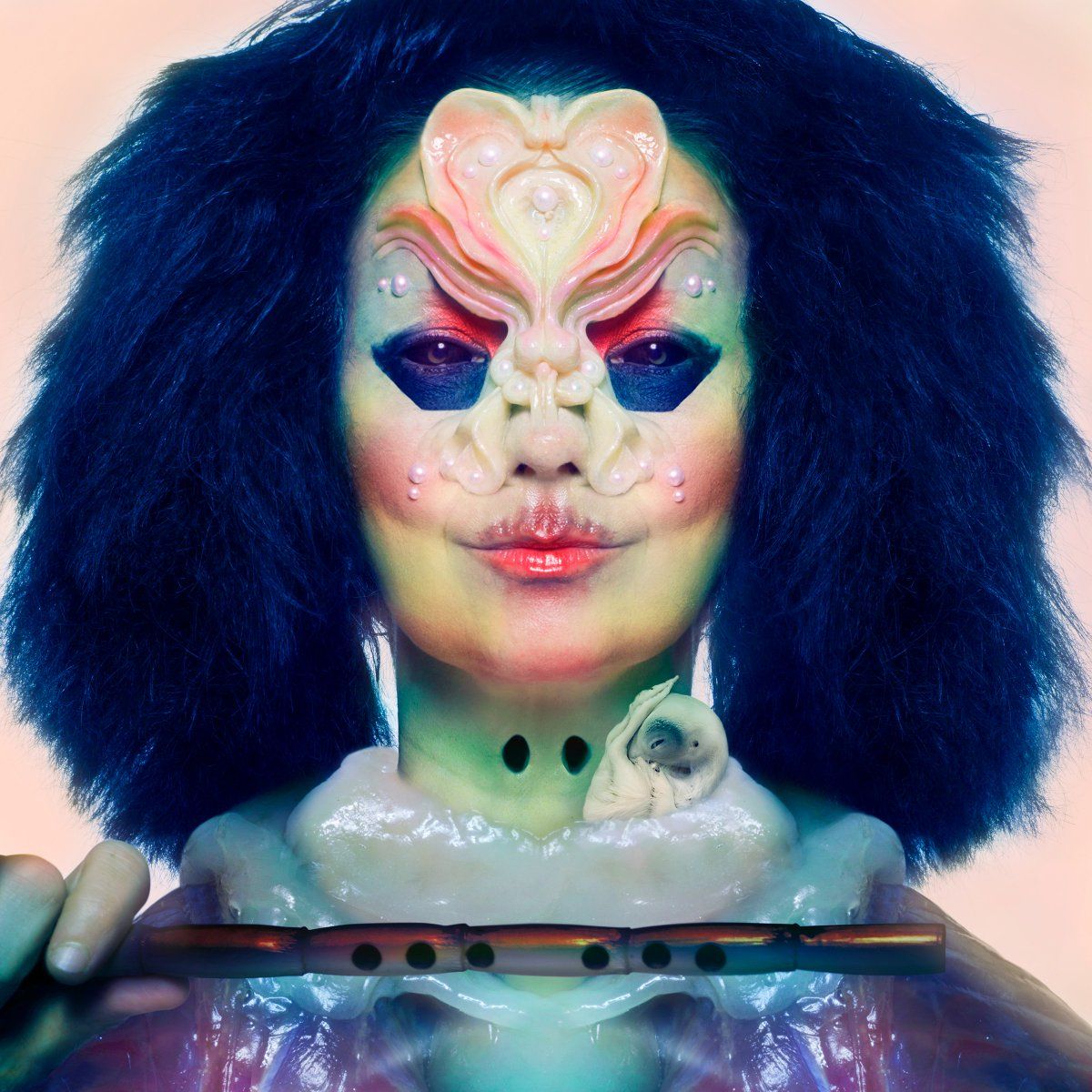Björk releases full-length ‘Utopia’
by Caroline Smith
2017-12-24

Björk
Utopia
One Little Indian · November 24, 2017

Utopia is gorgeous, fresh, and honestly inspiring, capturing the feeling of falling in love with someone after a time of darkness and seeing the world anew, as well as a strong matriarchal energy and rejection of male power.
What is there to say about Björk that hasn’t already been said? The Icelandic singer-songwriter has been at the frontlines of experimental for 15 years with the release of her first solo album Debut in 1992, although she’d been releasing music for twice as long – in 1977, when Björk was only 12 years old, her self-titled album Björk was released in Reykjavik, Iceland. She is an artist whose work has been consistently innovative, from her starts as an avant-garde pop singer all the way up to her last album Vulnicura, a sonically complex meditation on heartbreak and despair. It is immediately apparent from the very first song on Utopia that this album is the polar opposite to Vulnicura: the melodies are upbeat and bright and the lyrics are highly romantic, almost surprisingly so. Utopia is gorgeous, fresh, and honestly inspiring, capturing the feeling of falling in love with someone after a time of darkness and seeing the world anew, as well as a strong matriarchal energy and rejection of male power.
Opening track ‘Arisen My Senses’ leads us in with the words, “Just that kiss / Was all there is / Every cell in my body / Lined up for you.” The song, like the rest of the album, has Arca’s special touch: it samples one of his earliest released songs, ‘Little Now A Lot,’ and was given to him (real name Alejandro Ghersi) as a gift from Björk. But Björk collaborating with Arca is nothing new; 2015’s Vulnicura was also produced by Ghersi, and their relationship as musicians is well-documented. What really makes ‘Arisen My Senses’ so astounding as an opening track – and overall, what makes Utopia so outstanding as an album – is the deliberate intricacy of its arrangements (there are up to five different melodies at any given time), its gorgeous utilization of wind instruments, and Arca’s adept production, adding up to a beautiful and fresh new sound for such an enduring and adapting artist.
On Utopia, Björk explores a happier sound than she has in the past, and it suits her. The album opens with birds chirping, peaceful and pastoral, like walking through a forest that Arca is apparently also in (for me, this is probably true utopia). Wind instruments really get a chance to shine on this album, particularly the flute, and the effect is an airy cheer that permeates the love songs Björk has penned here.
The next tracks, ‘Blissing Me’ and ‘The Gate’ – which were also the album’s two lead singles – are love songs as well, albeit ones with different approaches. ‘Blissing Me’ reads like a teenage love song, with Björk singing, “I’m celebrating on a vibrancy / Sending each other MP3s / Falling in love to a song.” The song has a childlike playfulness, juxtaposed with its masterful production. ‘The Gate’ touches on something a little more mature, and follows up on the metaphor opened in Vulnicura of a chest wound caused by the hurt of a lost lover. Now, the chest wound is presented as a “gate” to give and receive love from, the concept of healing your past heartbreaks with the promise of someone new; the sadness you once carried with you now transformed into something that helps you navigate your new relationships.
Things shift to something a little harsher (but still beautiful) in ‘Body Memory,’ the album’s 10-minute long magnum opus where Björk poses the question, “How to capture all this love?” This question becomes the true heart of the album, and changes the meaning of the first few songs. We, as human beings, feel love for each other, and the first half of Utopia captures that feeling. The second half of Utopia presents challenges to that – what are the steps we have to take to prioritize love in our lives? How do we shield something as pure and personal as love from harm when the world at large doesn’t value that connection? Björk looks at this threat from her perspective as a woman and a mother, viewing the devaluation of love and women’s feelings as a patriarchal threat from men more emotionless than she. It is as much Björk’s fascination with the perfect world as her understanding that it is entirely unreachable. At the end of ‘Body Memory,’ she proclaims, “I’m trapped in legal harness / Kafka-esque with force like patriarchy / Avoid it to confront it.” This seems a pretty straight-forward reference to the custody battle she has been enduring with her ex-partner, artist Matthew Barney, that she explores in depth on ‘Sue Me.’
After ‘Body Memory’ comes ‘Features Creatures,’ ‘Courtship,’ ‘Losss,’ and ‘Sue Me,’ all of which take the album to a more contemplative place in their own way. ‘Features Creatures,’ along with the later ‘Tabula Rasa,’ are the only two songs on the album that don’t feature Arca’s production, and it shows— the tracks are stripped down compared to the complex layering and expert sound design that makes Arca one of my favorite producers. ‘Features Creatures’ showcases Björk’s incredible voice: her rolled r’s, sharp diction, and powerful vocal control combined with minimal production makes for a song that is oddly haunting juxtaposed with its rather cheery lyrics: “When I spot someone who is same height as you / And goes to same record stores / I literally think I am five minutes away from love.”
‘Losss’ and ‘Sue Me’ take a turn for the darker in terms of sound, although optimism remains present in Björk’s lyrics. There are challenges to building Björk’s personal utopia of love, but she takes them all in stride. On ‘Losss,’ the same airy flutes from earlier turn eerie as Björk becomes contemplative about love lost and how it defines you if you let it, although letting go of the past sets you free. ‘Sue Me’ follows a similar theme, where Björk pushes back against her ex-partner Matthew Barney and laments the ways in which the legal battle may have affected their daughter. There is anger and hurt but also strength in Björk’s voice as she proclaims, “Sue me all you want / I won’t let you denounce our origin.” Notable on this track is again the flutes, as well as Arca’s glitch-like production.
‘Tabula Rasa’ is the only other song that doesn’t feature Arca’s production, and it expands on the same theme as ‘Sue Me’ of female liberation from male control and influence. ‘Tabula Rasa’ is an epistemological term in philosophy that states that when we are born, we are born without preconceived notions and ideas, and any ideas that we eventually gain are a product of our experiences and not any innate knowledge. Subsequently, Björk proclaims, “Tabula rasa for my children / Clean plate: not repeating the fuckups of the fathers.” Lyrically, I found this to be one of the most powerful songs on the album, in which Björk addresses her teenage daughter, at the end of the song repeating over and over, “You are so strong.” It beautifully addresses the value of love between mother and child, rather than just in a relationship, as focused on earlier in the album.
The last three songs of the album bring it back towards full circle, with Björk acknowledging that, despite the challenges to love, it is more than worth it. She also touches on the healing power of music in ‘Saint,’ singing, “Music heals too / I’m here to defend it.” Final track ‘Future Forever’ is surprisingly sparse and stripped down for a track that Arca did produce, built solely off of synth chords with an organ-like effect applied. The way that the sound design is done, the song sounds almost like chamber music. Its lyrics sum up exactly what it appears Björk has been trying to get at for the entire album: On the refrain, she warbles, “Hold fort for love forever,” and she later asserts, “Watch me form new nests / Weave a matriarchal dome / Build a musical scaffolding.” Here, she appears powerful, confident, and again, she focuses on herself rather than the men who have hurt her and channels that hurt into her art. The song is, arguably, up there on the lists of best songs Björk has ever created.
My personal favorite Björk album (and this is a very tough choice) is 2001’s Vespertine for its boundary-pushing sound design and gorgeous lyrics. Björk approaches that here on Utopia in full force, delivering the kind of whimsy that only she is capable of, with the same Vespertine-esque slow pacing of songs and lack of focus on choruses, with much greater emphasis focused on sound design and atmosphere. The sound and songwriting of Utopia is mystifying. The way each and every arrangement comes together so effortlessly, with every song building on top of each other as the album progresses, is nothing short of masterful. Clocking in at over 70 minutes long, not a single part of the album drags, which is insanely impressive given that most albums I listen to can’t achieve this in 40 minutes. Here, Björk proves that she still has so much more to give as an artist. This is probably my album of the year, and I can’t stop listening.
